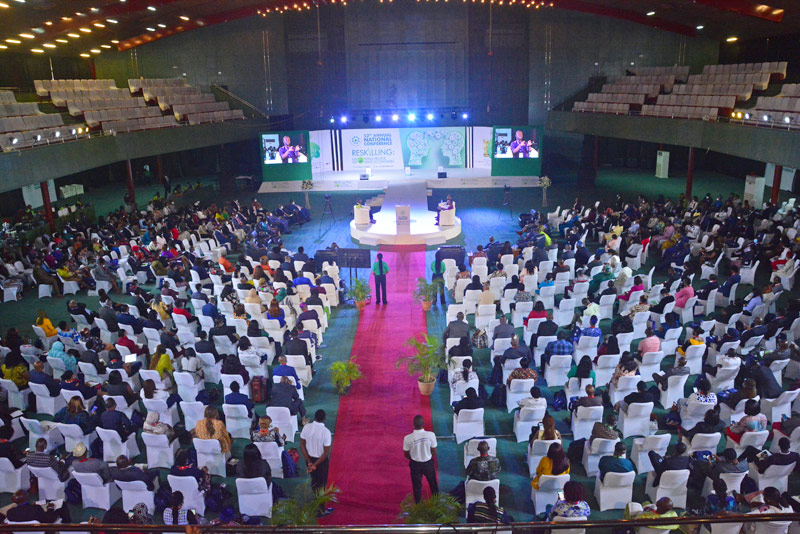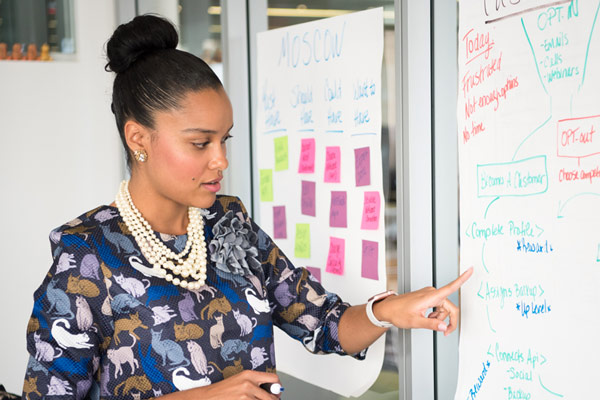Overview
It is fascinating how, in today’s world, the only constant is uncertainty. Plans made yesterday can quickly become tomorrow’s surprises. This raises a critical question: Are leaders truly prepared to navigate such an unpredictable future? Leadership today is no longer just about holding authority; it is about being agile. It is not merely about experience, but about emotional intelligence and the ability to adapt.
During Nigeria’s 2023 cash crunch, organisations that thrived did not just slash costs, they communicated clearly, empowered their people, and stayed purpose-driven despite the chaos. That’s the power of adaptive leadership. Today, leadership is less about titles and more about building people, not pyramids.
How the definition of a great leader evolved in the last decade
A decade ago, leadership was largely about authority, expertise, and control. It was rooted in bureaucracy and hierarchical structures, where leaders were expected to have all the answers, drive execution, and maintain command. The dominant style was “command and control.” However, today, leadership has taken a different shape. The focus has shifted from authority to empathy, from control to collaboration. Great leaders are now recognised for their ability to listen, adapt, inspire, and foster inclusive environments. Emotional intelligence, humility, and authenticity are now at the heart of effective leadership.
Leaders today act more as facilitators than just decision-makers. Leadership is no longer reserved for senior roles; it’s being cultivated at all levels. Competency models now reflect this shift; leadership competencies are developed alongside functional, technical, and behavioural skills, even from entry-level positions.
Several factors have driven this transformation:
- The Rise of Hybrid Work: Remote and flexible work arrangements demand trust-based leadership and effective communication across distances.
- Millennial and Gen Z Expectations: Younger generations prioritise purpose, regular feedback, and empowerment, reshaping leadership norms.
- Accelerated Change and Disruption: Constant change calls for agile, responsive leaders who can drive innovation and results through collaboration.
Ultimately, leadership has moved from power and position to influence and impact. The most effective leaders today are those who build trust, embrace diversity, and empower others, not just those who deliver outcomes. Leadership is now about inspiring and enabling, not simply commanding and controlling.
Skills emerging leaders must develop to stay relevant in the face of disruption
Leading effectively through this era of rapid disruption requires a new kind of leader, one equipped with future-focused competencies. Such leaders must:
- Demonstrate Creative Thinking: Navigating uncertainty demands more than linear thinking. Leaders must be creative and innovative in assessing disruptions and designing effective responses.
- Be Tech- and AI-Savvy: As technology continues to reshape industries, future-ready leaders must understand and leverage digital tools, data, and artificial intelligence.
- Be Resilient, Flexible, and Agile: In a fast-changing world, the ability to adapt quickly, recover from setbacks, and lead through change is critical.
- Embrace Lifelong Learning: With skills evolving at an unprecedented pace, continuous learning is no longer optional; it’s essential for staying relevant and effective.
Without these capabilities, future leaders will struggle to navigate the complexity and volatility that lie ahead.
How leaders can balance technical expertise with emotional intelligence in a fast-changing environment
Technical expertise refers to deep knowledge and skill in a specific area, while emotional intelligence involves the ability to recognise, understand, and manage one’s own emotions and those of others. Both are essential for effective leadership.
However, in times of uncertainty, rapid change, or crisis, emotional intelligence becomes even more critical. In such situations, leaders must be able to sense and respond to the emotional needs of their teams. This is key to maintaining employee engagement, as there is a strong link between emotional intelligence and how connected and motivated employees feel.
When leaders rely solely on technical expertise or operate with minimal emotional intelligence, they risk overwhelming their teams with pressure. This often leads to burnout, disengagement, and ultimately, talent loss. Good leaders understand this and strive to lead with empathy, awareness, and balance.
How to measure leadership readiness in a team
Leadership readiness is not simply about who is next on the organisational chart; it is about identifying who is truly prepared to step up when it counts. It goes beyond succession planning on paper; it requires assessing real capability and potential within a team.
Key Indicators of Leadership Readiness:
Key Indicators of Leadership Readiness:
Key Indicators of Leadership Readiness:
- Performance and Results: Evaluate consistency in meeting objectives and KPIs, especially under pressure. Are employees proactive in taking on additional responsibilities beyond their current role?
- Learning Agility: Assess how quickly they learn from experience and apply new knowledge. Adaptability is a critical trait in uncertain environments.
- Leadership Behaviours: Do they positively influence others? Do they role-model the organisation’s values? Leaders should lead by example, practising what they preach.
- Feedback and Assessment Tools: Use objective tools such as 360-degree feedback, leadership simulations, and behavioural assessments to gain insight into potential and readiness.
- Stretch Assignments: Expose high-potential employees to complex, real-world challenges to observe how they respond and grow under pressure.
- Talent Assessment: Evaluate individuals based on both performance and potential. Use a talent grid to place individuals appropriately and inform succession planning.
- Development Plans: Put personalised development plans in place to help potential leaders close skill gaps and build required capabilities.
- Leadership Frameworks: Implement a clear leadership framework with defined behavioural indicators and potential predictors. Core competencies may include leading and developing people, integrity, courage, curiosity, insight, and self-awareness.
Leadership readiness is best revealed through action, not theory. The leaders you want are those who can step forward confidently and stay grounded, especially in moments that matter.
How to ensure team’s goals align with the organisation’s overall strategic direction
This largely depends on the type of organisation in question. For some, strategic goals are centered around the bottom line, focused on profitability and market share growth. Others, particularly service-oriented organisations, may prioritise impact and service delivery over financial performance.
How leaders empower others to lead at all levels, especially in a decentralised or hybrid environment
This comes down to one critical element: an organisation’s values and culture. These form the DNA of any organisation and should be a constant focus for leaders. It’s not about lofty statements printed on banners, but about clear, actionable definitions of what behaviours align with the organisation’s values, and which do not.
When values are well-defined and consistently upheld, leadership naturally emerges at every level, especially in hybrid or decentralised work environments. In times of crisis or uncertainty, when quick decisions are needed and there’s no time to escalate up the chain, strong values act as a compass. They guide teams in the absence of manuals, policies, or direct supervision, particularly when facing novel challenges. This is why investing in clarity around organisational values and culture is not optional; it is essential. It empowers people to lead, act decisively, and make the right choices, even in the most unpredictable circumstances.
Advice to young professionals who are aspiring to become resilient leaders, especially in an environment where current leaders are reluctant to leave their positions
Resilience is not something a person is born with; it is something that is built. It is not about never falling; it is about how a person rises, how they learn, and how they lead through adversity. To be a resilient leader, the following principles are essential to embrace:
- Embrace Discomfort as a Teacher: Growth often lies outside your comfort zone. Say yes to stretch assignments, be open to feedback, and approach it with a growth mindset.
- Invest in Self-Awareness: Know your values, your triggers, and your blind spots. Resilient leaders first lead themselves before they lead others.
- Build a Strong Support Network: Find mentors, coaches, and peers who challenge and uplift you. Resilience doesn’t mean doing it alone; it means knowing when to lean in and when to lean on others.
- Stay Curious and Keep Learning: In a fast-changing world, continuous learning is non-negotiable. Go beyond your job function, understand the business, learn about people, culture, and leadership. Versatility adds value and earns respect.
- Lead with Empathy and Purpose: Resilient leaders lead from the heart. People may forget your words, but they will never forget how you made them feel, especially during tough times. For Gen Zs and rising professionals, resilience is not about pushing through at all costs; it is about being adaptable, emotionally grounded, and purpose-driven.
Practical Advice for Developing Resilience
- Redefine Failure as Feedback: Failure should not be feared but embraced as a catalyst for growth. Resilient leaders demonstrate the ability to learn swiftly, adapt effectively, and progress beyond setbacks, not merely recover from them.
- Pursue Progress Over Perfection: One should not aspire to be flawless, but rather to be authentic. Every exemplary leader has a narrative shaped by challenges, fears, and failures. It is this authenticity that earns genuine respect, often far more than the pursuit of perfection.
- Build Emotional Intelligence: Cultivate self-awareness, empathy, and emotional regulation, essential for effectively navigating challenges and providing meaningful support to others.
- Volunteer for Stretch Assignments and Ask for Feedback: Growth occurs when individuals push beyond their current capabilities. Actively seeking feedback serves as a vital tool for self-improvement, offering valuable insights into areas for development.
- Anchor Yourself in Purpose: Purpose serves as a compass during uncertainty. It grounds leaders through setbacks and enables them to lead with clarity and conviction, even when the path is unclear.
Resilient leaders do not avoid storms; rather, they cultivate inner calm amidst the storm. As one advances in leadership, the demands extend beyond technical expertise, requiring heightened clarity, courage, emotional intelligence, and steadfast conviction. True resilience begins with self-leadership, grounded in purpose, compassion, and strength, which enables leaders to guide others through complexity with composure and confidence.
Major uncertainties leaders should be preparing for today and the future
Many of the jobs that will emerge in the future do not yet exist today. As technological advancements continue to reshape industries, leaders must be prepared to navigate unprecedented changes. While creative thinking will be essential in responding to future disruptions, it is equally important for leaders to anticipate and proactively prepare for the far-reaching impacts these changes will bring.
In addition, cybersecurity threats have become a new form of warfare. Large organisations, especially those with substantial financial resources, are frequent targets of cybercriminals who aim to disrupt operations and demand a ransom. This form of disruption poses a significant risk and requires leaders to implement robust cybersecurity strategies.
Geopolitical conflicts and wars across various regions also have far-reaching consequences. Their effects extend beyond the nations involved, impacting global businesses and trade partners. Leaders must recognise that political and economic interests among nations will continue to create instability, and they must be equipped to lead through such uncertainty.
Environmental instability is another growing concern. Weather patterns have become increasingly unpredictable, and climate-related disruptions are likely to affect operations, logistics, and supply chains. Forward-thinking leaders must integrate environmental resilience into their organisational strategies.
Internally, organisational culture is also undergoing significant disruption. The expectations and behaviours of younger generations, particularly Gen Z, challenge traditional workplace norms. High turnover rates, differing values, and new ways of working are reshaping how organisations function. Leaders must be prepared to manage this cultural shift with flexibility and openness.
How Leaders Must Prepare
To effectively lead through these multifaceted disruptions, future leaders must:
- Demonstrate resilience, agility, and flexibility in responding to rapid change.
- Commit to continuous learning, staying current with industry trends and emerging challenges.
- Embrace technology and artificial intelligence, ensuring digital fluency and innovation readiness.
- Strengthen emotional intelligence to manage diverse teams and build inclusive cultures.
- Anticipate risk and develop adaptive strategies across economic, geopolitical, technological, and environmental domains.
In conclusion, disruption is no longer an occasional challenge; it is the new norm. The leaders who will thrive are those who can adapt swiftly, lead with clarity, and foster cultures that are both innovative and resilient.
This thought leadership piece was adapted from the May 202oo5 edition of the ‘CIPM and YOU’ webinar and represents the opinions of the panellists during the session.




